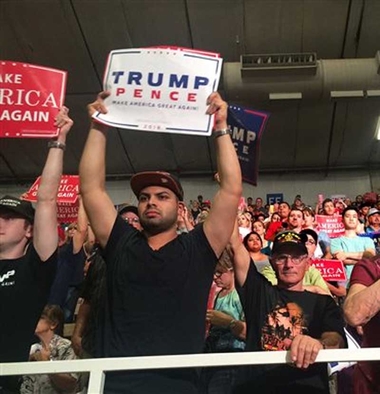As Trump tries minority outreach, many blacks unconvinced

Akron, Ohio (AP) — Black Republicans cheer Donald Trump for a newfound outreach to African-Americans, but say the GOP presidential nominee must take his message beyond arenas filled with white supporters and venture into the inner cities.
Many rank-and-file black voters, meanwhile, dismiss the overtures as another racially charged pitch from a campaign aimed exclusively at whites, from Trump's emphasis on "law and order" to his withering critiques of President Barack Obama, the nation's first black chief executive. It was Trump in 2011 who fiercely challenged Obama's U.S. birth.
"Any minority who would vote for him is crazy, ought to have their head examined," said Ike Jenkins, an 81-year-old retired business owner in the predominantly black suburb of East Cleveland.
Foluke Bennett, a 43-year-old from Philadelphia, went further, labeling the GOP standard-bearer's remarks as "racist," pointing, among other things, to his referencing African-Americans as "the blacks."
Trump is scheduled to appear Wednesday in Jackson, Mississippi, an 80 percent African-American city and capital of the state with the nation's highest proportion of black residents. It is unclear whether he will address black voters directly; so far, his appeal to them has been delivered before white audiences in mostly white cities.
Mississippi is overwhelmingly Republican because of whites' loyalties, as opposed to battlegrounds such as Ohio, Pennsylvania and Florida, states Obama won twice and where the largest cities offer at least a theoretical chance for Trump to pursue marginal shifts among significant black populations.
Trump has previously rejected high-profile speaking slots at the NAACP's annual gathering, along with events sponsored by the Urban League and the National Association of Black Journalists.
"He's got to take his arguments to the streets," said Brandon Berg, a black pastor who drove Monday from Youngstown, Ohio, to hear Trump at the University of Akron. Berg said he's an outlier: an undecided black Republican. For most African-Americans, Berg said, Trump must "meet them where they are."
Trump has scheduled an event Thursday billed as a roundtable with black and Latino leaders invited to his New York offices, and his aides say he is considering more rallies in heavily minority cities in swing states. The Washington Post first reported those plans, specifically mentioning charter schools, small businesses and churches in black and Latino communities.
It's a well-known electoral conundrum for Trump and Republicans: The United States population grows less white with each election cycle, so to defeat Democrat Hillary Clinton, the New York billionaire must attract more non-white voters or run up an advantage with white voters to a level no candidate has reached since Ronald Reagan's 1984 landslide.
Obama won 93 percent of black voters in 2012 and 95 percent in 2008, according to exit polls. This year, polls suggest Trump could fare even worse than the Republicans who lost to Obama.
Trump has confronted his steep path in the last week, asking minorities, "Give Trump a chance!"
In Wisconsin, he declared to minorities: "You live in poverty, your schools are no good, you have no jobs, 58 percent of your youth is unemployed? What the hell do you have to lose?" He argues illegal immigration disproportionately affects economic opportunities of blacks and Hispanics.
In Ohio, he insisted without evidence that foreign "war zones" are "safer than living in some of our inner cities." He pledged a Trump administration would "get rid of the crime," allowing minorities to "walk down the street without getting shot."
Calvin Tucker, the lone black GOP convention delegate from Pennsylvania, says Trump's arguments resonate with him. "We need a change agent," said Tucker, 64, of Philadelphia. "He's breaking down his overall economic platform and relating it to African-Americans," Tucker added, extolling the GOP's emphasis on entrepreneurial pursuits.
Certainly, each Trump pronouncement drew roaring approval from his rally audiences. Many black voters, however, hear the appeal differently.
As he sold Cleveland Cavaliers NBA championship swag, street vendor Steve T, 47, said the "disrespectful" comments represent "the real Trump."
"Not all of us live in poverty, crime," he said. "You can't get votes from people you don't even understand."
In Philadelphia, Bennett said, "It's crazy to think that he would have the audacity to ask us what we have to lose. If anything, his comments just made the line even more clear as to why black people won't vote for him."
In East Cleveland, Jenkins and several other retirees gathered in a neighborhood restaurant echo many of Trump's arguments. James Smith, a 79-year-old former butcher, points out the window and laments "a community that's old and poor." Jenkins says "handouts keep people in slavery." Randall Darnell blasts an economy that traps laborers, black and white, in "legalized slavery."
But every one plans to vote for Clinton, and nearly all said they see Trump's latest arguments aimed more at whites.
"He's talking about black people" when he mentions violence in cities, Smith said, "not to black people."
___
What political news is the world searching for on Google and talking about on Twitter? Find out via AP's Election Buzz interactive. http://elections.ap.org/buzz
By Bill Barrow and Errin Haines Whack, Associated Press. Copyright 2016 The Associated Press. All rights reserved. This material may not be published, broadcast, rewritten or redistributed.
The Gayly – August 24, 2016 @ 10:45 a.m.





